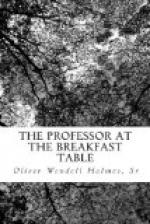I never set great store by my head, and did not think Messrs. Bumpus and Crane would give me so good a lot of organs as they did, especially considering that I was a dead-head on that occasion. Much obliged to them for their politeness. They have been useful in their way by calling attention to important physiological facts. (This concession is due to our immense bump of Candor.)
A short Lecture on Phrenology, read to the Boarders at our Breakfast-Table.
I shall begin, my friends, with the definition of a Pseudo-science. A Pseudo-science consists of a nomenclature, with a self-adjusting arrangement, by which all positive evidence, or such as favors its doctrines, is admitted, and all negative evidence, or such as tells against it, is excluded. It is invariably connected with some lucrative practical application. Its professors and practitioners are usually shrewd people; they are very serious with the public, but wink and laugh a good deal among themselves. The believing multitude consists of women of both sexes, feeble minded inquirers, poetical optimists, people who always get cheated in buying horses, philanthropists who insist on hurrying up the millennium, and others of this class, with here and there a clergyman, less frequently a lawyer, very rarely a physician, and almost never a horse-jockey or a member of the detective police.—I do not say that Phrenology was one of the Pseudo-sciences.
A Pseudo-science does not necessarily consist wholly of lies. It may contain many truths, and even valuable ones. The rottenest bank starts with a little specie. It puts out a thousand promises to pay on the strength of a single dollar, but the dollar is very commonly a good one. The practitioners of the Pseudo-sciences know that common minds, after they have been baited with a real fact or two, will jump at the merest rag of a lie, or even at the bare hook. When we have one fact found us, we are very apt to supply the next out of our own imagination. (How many persons can read Judges xv. 16 correctly the first time?) The Pseudo-sciences take advantage of this.—I did not say that it was so with Phrenology.
I have rarely met a sensible man who would not allow that there was something in Phrenology. A broad, high forehead, it is commonly agreed, promises intellect; one that is “villanous low” and has a huge hind-head back of it, is wont to mark an animal nature. I have as rarely met an unbiassed and sensible man who really believed in the bumps. It is observed, however, that persons with what the Phrenologists call “good heads” are more prone than others toward plenary belief in the doctrine.
It is so hard to prove a negative, that, if a man should assert that the moon was in truth a green cheese, formed by the coagulable substance of the Milky Way, and challenge me to prove the contrary, I might be puzzled. But if he offer to sell me a ton of this lunar cheese, I call on him to prove the truth of the Gaseous nature of our satellite, before I purchase.




